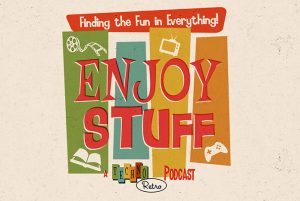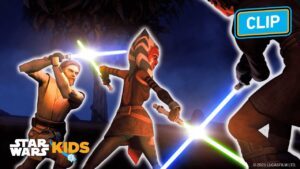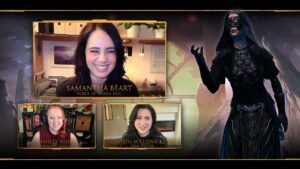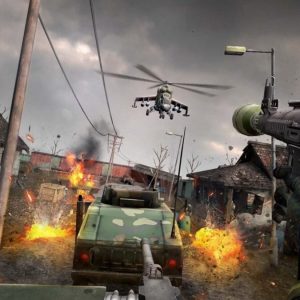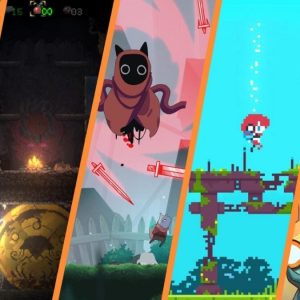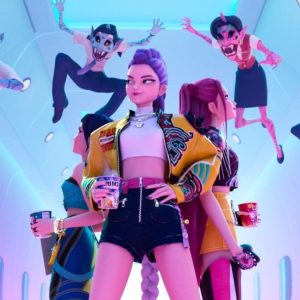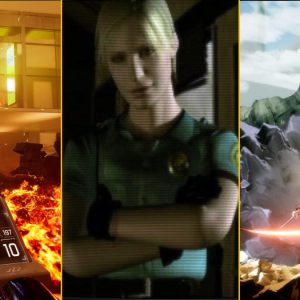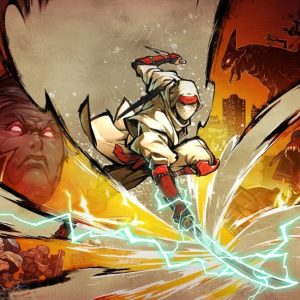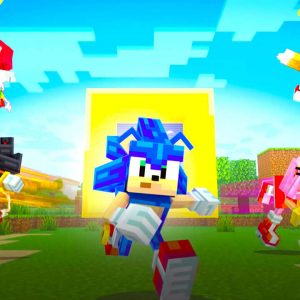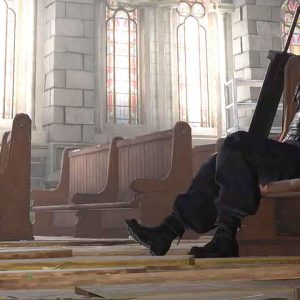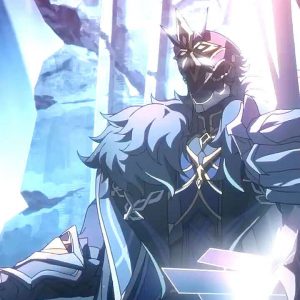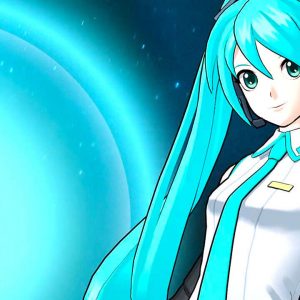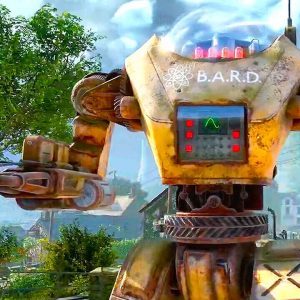Bend Studio, the developers behind the PS4 exclusive Days Gone, have seen the PlayStation platform grow through the ages. Starting out with Bubsy 3D, one of the earliest 3D platformers, they pivoted to great success with the Syphon Filter series–one of the original PlayStation’s more defining first-party games. In the time since, Bend Studio worked closely with other developers on franchises like Uncharted and Resistance, but on the year of Syphon Filter’s 20th anniversary, the studio is launching its first new IP in two decades.
After spending some hands-on time with the game, we spoke with creative director John Garvin and game director Jeff Ross about the studio’s formative years and how the new open-world game set in the Pacific Northwest aims to shake up the familiar trappings of the setting. The following interview has been edited for clarity and readability.

Bend Studio is actually one of the oldest PlayStation developers still around today. This is the first new IP coming from the studio in a long time, so with that, there seems to be a lot of perspective on what makes a good Sony game.
John Garvin: Well for 20 years, I worked on the Syphon Filter series, Resistance: Retribution, Uncharted: Golden Abyss, and among others. We’ve always been working on third-person shooters that are narrative-driven, that’s really what we do. But you’re right, it’s our first new IP in a long time. However, we’re always thinking of ways to push the gameplay and ourselves further. The thing about working on Days Gone, is that the PS4 obviously has got a lot more power than anything we’ve worked on before. We couldn’t have done something like the hoard gameplay on any other platform like the PS3 or Vita, and it was really exciting for us to do work on the PS4.
Jeff Ross: To me, Bend Studio just always goes for it. We’re in Central Oregon, we’re kinda outsiders, but we’re about making this big game. This one is certainly the biggest, but as a developer, we’re small, scrappy and we’re willing to kinda go for it and let it all hang out on this title.
Garvin: And we’re really lucky because Sony, I think, is unique to publishers and to platform holders because there is so much longevity in the production team. Some of the people on staff have worked on Bubsy 3D, and they’ve gone on to work on bigger games. But to your point about seeing the evolution of PlayStation, it’s been pretty incredible because I love the fact that Shuhei Yoshida is willing to take chances and say, “Hey, how about a next-gen handheld platform? Or how would you guys like to build an Uncharted game on that?” That was quite an opportunity for us and that was something that we really appreciated happening.
So Bend Studio has been making Days Gone over the course of six years, and we saw the game for the first time during the midpoint of that at E3 2016. Over this period, both Sony and the popularity of the zombie sub-genre has changed. Can you talk about how the game has changed over the years, and what’s stayed constant?
Garvin: Here’s the funny thing about Days Gone, the core idea has been the same from day one. We had a concept painting that our art director had done, just spitballing ideas, and it’s this character–we weren’t calling him Deacon St. John back then–but he was sitting on the roof of an old sawmill and 1,000 zombies are snaking their way up to him. Our first tech demo was a re-creation of that and you have this one guy who’s going to be fighting them. So we really asked ourselves “how do we turn that into a game?” You see movies that kinda do that, but the question is, how do you turn that into a game and make it fun? That was literally what drove the development early on for Days Gone.
Ross: That key image, as a matter of fact, was the basis for our first E3 2016 demo. We knew it was a risk to come out with our biggest asset. That sawmill from the original concept piece was our first public demonstration of the game and we executed on that vision. Six years is a lot of time, but we also see it as a plus. It gives us the time to get things right. It’s a great luxury. It is a long time to work on a game, but it’s also a huge open world, dynamic game in next-gen fidelity.
All the highways are destroyed and you’re doing a lot of off-roading because they were trying to stop the hoard. These pieces all kind of tied together and basically what it’s taken over the last six years is turning that into a game that had elements that were familiar because we feel really strongly that that’s what genre is. It’s the players that bring expectations to a game and they want to experience something that they’re going to have fun with, but at the same time, we actually want to go against those expectations as well.
Days Gone – Sarah & Deacon’s Wedding Trailer
Please use a html5 video capable browser to watch videos.
This video has an invalid file format.
Sorry, but you can’t access this content!
Please enter your date of birth to view this video
By clicking ‘enter’, you agree to GameSpot’s
Terms of Use and
Privacy Policy
I actually kind of appreciate that this game is set in the Pacific Northwest. It’s a bit of an unusual area to have an open-world game.
Garvin: Yeah from the beginning we wanted it in the Pacific Northwest. Most people actually don’t know that the region is actually the mostly desert. Seattle is on the west side of the Cascade Range, as is about a third of Oregon, and that’s where all the rain is. That’s where all the green forest is. Where we live, it’s mostly all desert which means that it’s all scarred by volcanism. Which means you have ravines, you have buttes, you have all these steep sort of crevices everywhere. So all the vegetation is built up around that because it’s high desert, it’s very harsh, very extreme.
We haven’t seen this in a video game, and we thought it would be interesting, fun to explore and it would look beautiful. What better backdrop to fight a horde than this amazing environment that you’re in.
It actually went against a lot of my own expectations for what the setting was all about.
Garvin: Yep, and it’s all absolutely real. All this stuff is heavily researched so like the Belknap Crater is a place you can go in central Oregon. Something that we really haven’t talked about, that we’re really proud of, is the fact that all the different regions in the game have unique weather systems. It rains a lot less in the Belknap area, whereas the Cascade region it rains a lot more. As you move further south and into other biomes, you’re gonna run into other types of weather patterns that are totally unique to those regions.
Ross: Right, it’s a beautiful and sinister environment. And honestly, it’s like a character in the game in its own way. It can be snowing in the morning, it can be hot at lunch, then it can be snowing again or raining at night. It can snow as late as June or July too. It’s really a dynamic environment, so we’re not really stretching much for the game. We’re just delivering on what’s there.
A common element for a lot of first-party PS4 games is that there’s a strong focus on character, and Deacon seems to find himself in a lot of different events with other characters. I noticed there was a section in the main menu called Storylines, which kept track of your current relationships and objectives for these key characters.
Ross: I’m glad you noticed the Storylines. We wanted to make sure there was very little dissonance in the open world and the story. We haven’t really shown a lot of the main story yet, but everything you do in this world matters for an important reason. The Storylines mechanics was a way to kinda emphasize advancing the smaller threads in the larger storyline. It’s a way for us to connect the open world activities that the player is doing and kinda frame it in a way that shows why it matters. There is a really tight integration between the two–the story and the open world systems.
Garvin: I can tell you that when it comes to making a Sony first-party PS4 AAA exclusive, there’s a heavy emphasis on character-driven storylines and narratives. You see a little bit of that in the demo, where you might see the storyline where you meet this girl you have to rescue. Last time I beat the game, it took me 30 plus hours to beat the golden path. That’s one of the things we’ve been doing at Bend Studio for all these years; Character-driven experiences, and Days Gone is absolutely no exception.

The release of this game is slowly coming up. So after spending so long on this game, is there anything about it that sticks out most for you?
Garvin: Yeah I mean, to me, when I’m still playing I always have to pinch myself. It’s something that we set out six years ago. We kinda told Sony that “Alright, we are going to make this huge open world game, with all these systems”. And nobody really believed us, they trusted us, but they didn’t believe it. To see that stuff come together, ultimately, when you get to the final credits of the game, the feels are there. Everything you’ve said it came together and the game stung, and it’s everything we set out to make and more.
Ross: It’s really transformed us. When people tell us no, that redoubles our effort. It’s like when they say something is impossible, we’ll prove that we can do it. And man, I think we did it. So I’m really super proud of that. From my point of view, like you said, it’s all about the feels. People are not expecting it and they’re going to be surprised. By the time you get done with it you’re going to have experienced a lot.
Garvin: I think [Days Gone] is everything Bend Studio represents. We are sort of punching above our weight. We are really ambitious and we really want to create something that is awesome, even when we’re just a small studio in the middle of the high desert.
